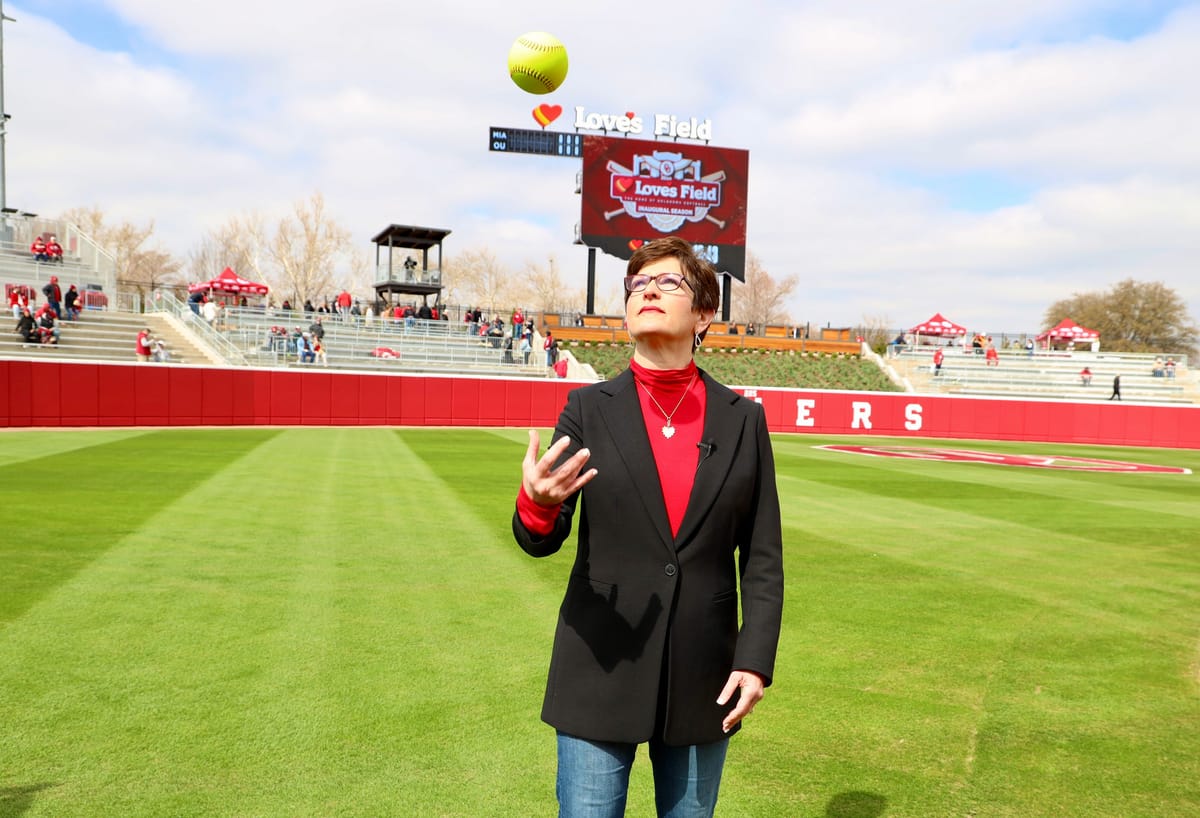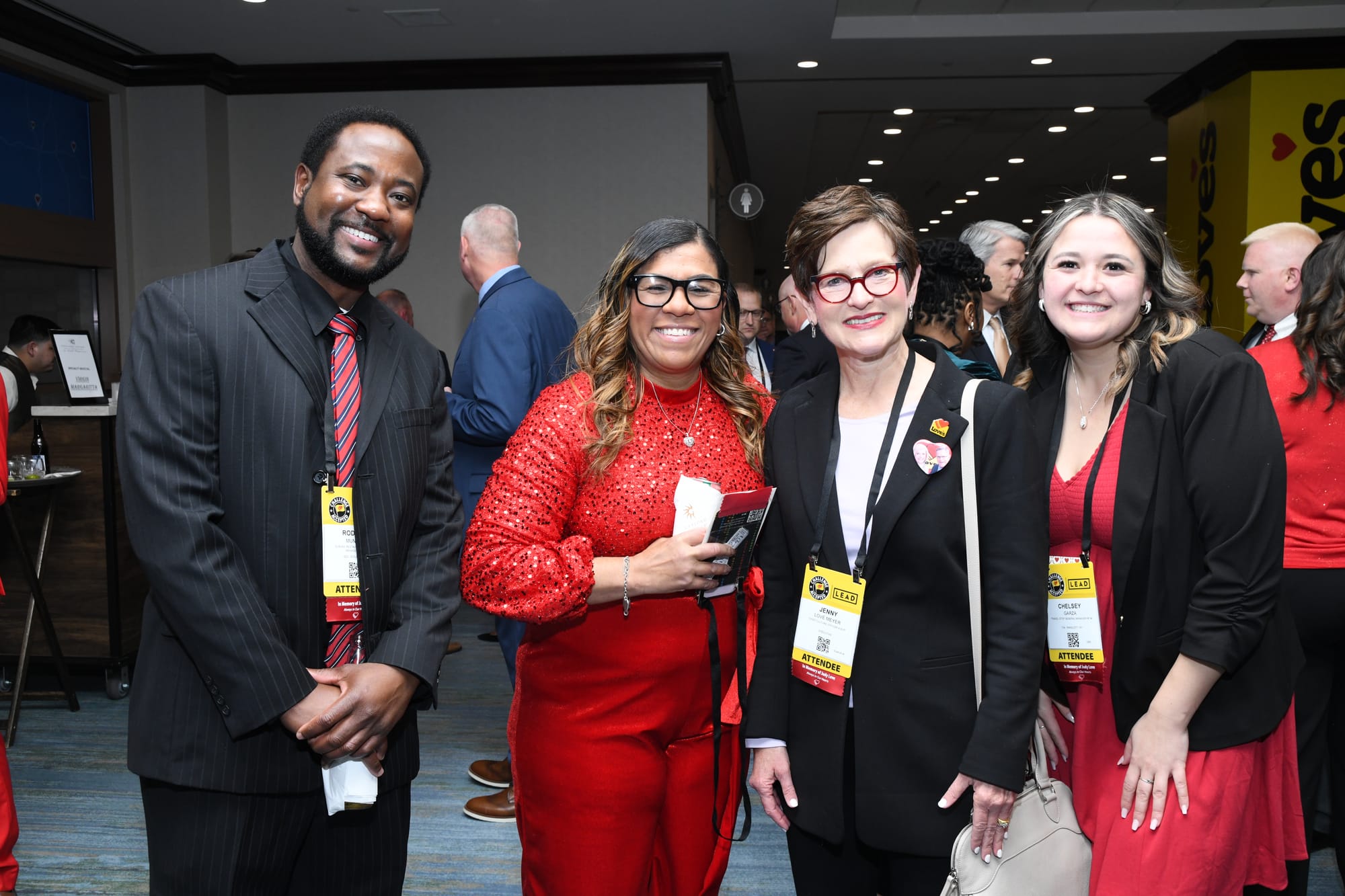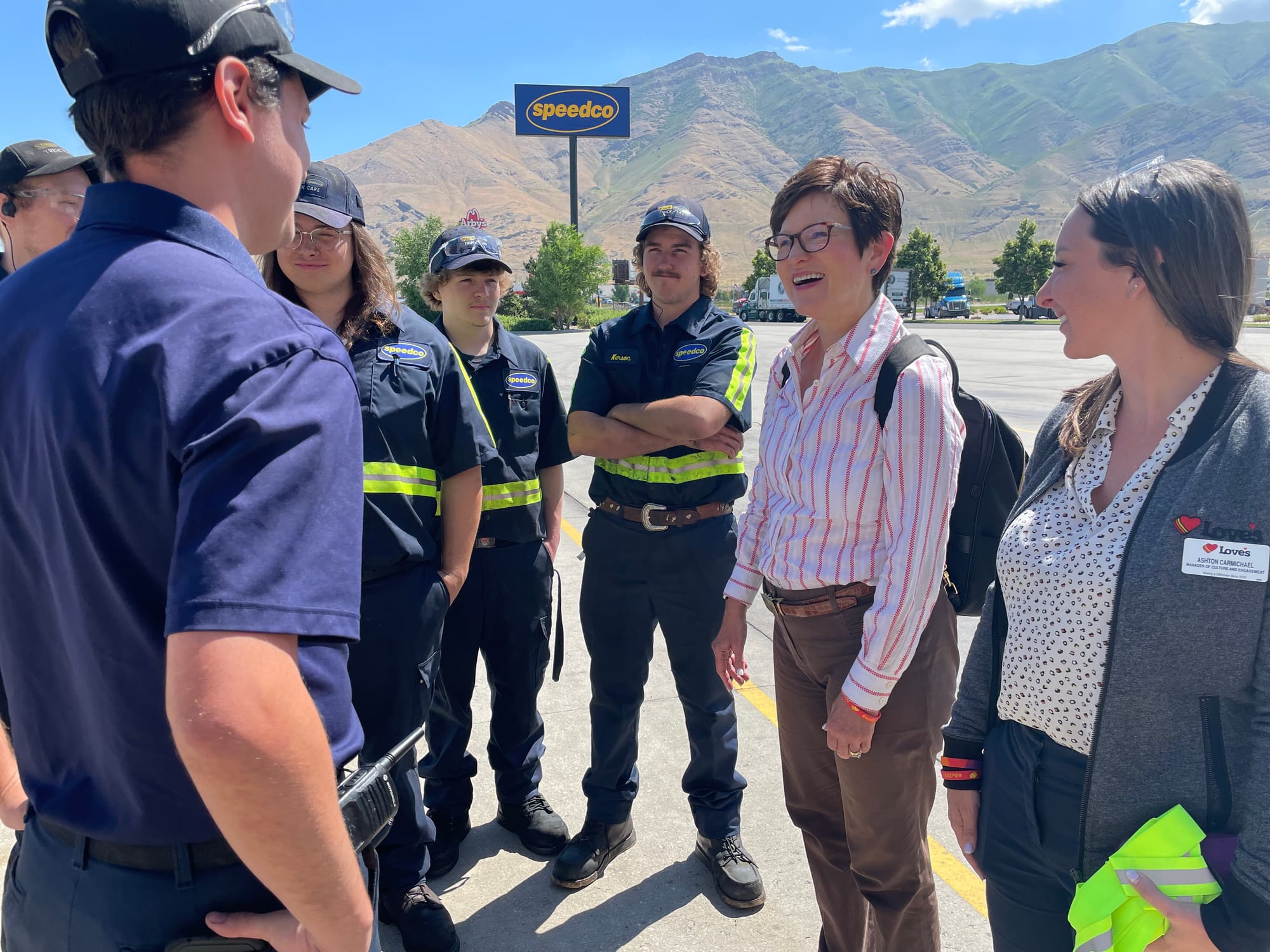
Any road tripper worth her salt knows to keep one eye on the horizon at all times, looking out for that glowing beacon: the tall, gold sign with hearts on it. Whether we’ll admit it or not, most of us have our go-to guilty pleasure “road food” that we head for when we walk into a Love’s — Funyuns and a Coke Zero, anyone? Jenny Love Meyer, the company’s Executive Vice President and Chief Culture Officer, is no exception.
When she pops into one of the 655 Love’s Country Store & Travel Stops scattered across 42 states, her beverage of choice is a bottle of water or a medium-sized Brazilian coffee. Her go-to snack is the yogurt trail mix; if it’s lunchtime, it’s a chicken taco with Tabasco. Worth knowing: Tacos are made fresh, in-house, every day and they’re a huge hit. “We make it all: tacos and hot sandwiches, and then we're rolling out new menu items all the time. Decades ago, we started cutting fresh fruit and then put it in fruit cups, like the grocery stores do, and then it kind of evolved,” she says. The tacos came from a Texas Love’s divisional. “They started prepping and making tacos at one of his locations, and now we've got hundreds of fresh kitchens across the country.”
Perhaps Love Meyer was fated to join the family business, but she did it in her own way and not immediately. After graduating from Colorado College in 1992, she — like many new grads — didn’t know what she wanted to do, but thought working in restaurants might be fun. “I had some friends in Washington, D.C., and they were like, ‘Why don’t you just move out here?’ So I did.” She got a job at a hotel and worked her way into the restaurant side of the hospitality industry. “I liked it, but you know, Washington is kind of a nomadic city. My friends moved away, and so I ended up moving back to Oklahoma City.”
That’s when her savvy dad, the late great Tom Love, casually mentioned that the company had a restaurant concept it was launching out in western Oklahoma, and wondered if she’d like to help. “The concept was essentially a Western twist on a full-service restaurant. This was out at I-40 and Exit 7. I remember that because I was traveling back and forth frequently,” she says.
Named “Cowboys,” the restaurant had a bakery section with fresh baked goods in addition to the restaurant itself. Not a bad idea, per se, but also not one that survived. “I will say, in transparency, that sometimes with innovation, things don’t work out,” Love Meyer says. “The good thing about our family is that we tend to pitch in on things.” In this case, she mused, the family may have pitched in too much. Literally too many cooks in the kitchen. As they are wont to do, Cowboys rode off into the sunset, but by then Love Meyer had been lassoed by Love’s and decided to stick around.
Love Meyer’s team handles communications, culture and events for the Love’s suite of companies, which employ more than 40,000 people. She loves her job. “One thing that’s super cool about my job is there’s really no day that’s alike when I’m out in stores,” she says. Those in-the-field days start early — around 6 a.m. — and don’t stop until after dinner with members of the Love’s team.
Things are a little more predictable when she’s at her Oklahoma City office. She toggles between meetings and “kind of observing and guiding behavior, as we encourage — and really expect — our people to live our culture. Our culture really is the Love’s differentiator,” she says. Love Meyer’s dad, who founded the company along with her mom, Judy, believed wholeheartedly in living — and conducting business — with integrity and honesty.
Shane Wharton, Love’s president, says it this way: “Tom always listened and was sincerely interested in knowing the stories of employees and customers. He wanted to hear their thoughts, ideas and hopes for them, their families and the company. He credited the company’s success to the people who worked for us. He could relate to all employees, but had a soft spot for those on the front line at stores. In many respects, he was an ordinary person who built an extraordinary business alongside his wife Judy and his family, who he loved deeply.” Love spent a good chunk of his time touring stores, checking in, talking with employees and learning from them what was working and what was not. Love Meyer began taking on more of the “culture tours” duties a number of years ago.
Sadly, the elder Loves are no longer with us. Tom, a forward-thinking entrepreneurial genius by any standard, passed away in 2023. Judy, a joyful powerhouse and serious philanthropist in her own right, followed in 2024. “It’s been a transition. We’re lucky that we’ve got a close family,” Love Meyer says. “It’s hard. You kind of don’t think it’s going to happen, even though it’s the cycle of life, and then it starts to. And it’s hard.”

The Love’s corporate success story is eclipsed only by its commitment to philanthropy. As a company and as individual team members, giving back is an intrinsic value. One percent of net profits is donated annually, with 34% going to youth and education; 25% for health and human services; 16% going to civic and community causes and 25% going to other charities and initiatives. A slew of corporate employees, more than 600, donate their time to good causes. In 2023, that meant 1,400 volunteer hours were contributed. Each of the 88 districts in the field is allocated $5,000 per year to donate to non-profits in the areas, with lots of input from employees. Similarly, each new store donates $5,000 to the local community during a ribbon-cutting ceremony. By the end of 2024, approximately $550,000 was donated in these ways.
Love Meyer and her siblings Frank and Greg Love now helm the company, with plenty of help from the top-tier team of executives they’ve assembled. Members of the third generation of Love family members, dubbed ‘G-3’ by Love Meyer et al., have begun making their way into the family business, ensuring that while times may change the family-driven, people-first nature of the Loves’ suite of companies is in safe hands.
The Love family’s success story is so entrenched in our state’s history, it’s become part of our lore. A point of pride for all Oklahomans. For a young Tom and Judy Love, though, the company began as many great American businesses do: as a way to feed the couple’s growing family. Back in 1964, the then-named Musket Corporation took a lease on an abandoned service station in Watonga. Eight years later, there were 40 stores, scattered throughout western Oklahoma. The couple parlayed this early iteration of Love’s into much more, adding goods and services for professional drivers and travelers-by-road. In 2022, Forbes estimated Love’s Travel Stops & Country Stores to be worth $9.7 billion; estimated 2024 revenue was $24 billion.
The Luxiere List: Fun Facts About Love’s, the Loves and Jenny Love Meyer, in no particular order
The fresh fruit you see displayed in every Love’s is cut fresh daily, on the premises. Hot food is made in-house, too.
Love’s longest-serving employee is Harold Wells. He’s been with the company for 52 years, starting at the first service station in Watonga. Today, he works at Love’s corporate headquarters in Oklahoma City as a retail accounting systems manager.
Love Meyer is a past board member of the American Red Cross, Teach for America, the Foundation for Oklahoma City Public Schools and the Arthritis Foundation. She was also past chairperson of the Children’s Miracle Network Council, past co-chair of United Way Women’s Leadership Society and a Leadership Oklahoma City Alum, Class of XVII.
Love’s has 165 EV chargers, with plans to add 80 more to 20 locations in 2025.
Jenny has been recognized with a Byliner Award from the Association of Women in Communications, Oklahoma City Chapter; an Oklahoma City University Societies award in recognition of her work with Children’s Miracle Network Hospitals; Leadership OKC’s Paragon Award for outstanding volunteer work; and a Women in Leadership award from Langston University.
Currently, Jenny serves on the Greater Oklahoma City Chamber of Commerce board of directors, the Oklahoma City Community Foundation board as a trustee, the Children’s Hospital Foundation board of trustees and the board of governors for Children’s Miracle Network Hospitals. She spearheads the annual Love’s fundraising campaign for Children’s Miracle Network Hospitals. Under her leadership, in the last 20 years, Love’s has raised more than $40 million for Children’s Miracle Network Hospitals across the nation. The largest part is raised during a five-week campaign during peak travel stop season wherein customers and employees donate.
The amount of water Love’s sells per year would fill 10 Olympic-sized swimming pools and, if arranged end to end, the items Love’s sells off the roller grill per year would extend from Orlando, Florida, to Tacoma, Washington.

About Love’s Family of Companies
Most of us know Love’s Country Stores & Travel Stops, but there are five companies under the Love’s corporate umbrella.
Gemini is a motor transport company with a fleet of more than 1,050 trucks. Its drivers transport fuel and other products to Love’s locations nationwide. They also transport ethanol to terminals throughout the United States. Gemini proudly holds the distinction of being one of the industry’s safest transport companies.
Musket Corporation is a fuel trading and procurement company, specializing in commodity supply, trading and logistics across North America. It handles billions of gallons of crude oil, NGL, natural gas, petroleum products, renewable fuels and DEF each year.
Speedco, founded more than 25 years ago, serves professional drivers in its more than 400 locations. It provides comprehensive lube, tire and light mechanical services and, together with Love’s, makes up the largest nationwide network of oil change and preventative maintenance providers.
Trillium specializes in alternative fueling solutions: fuel supply, design, installation and operation for offerings including CNG, hydrogen, EV charging infrastructure, solar installation and on-site electricity generation. Between them, Love’s and Trillium own 65 public-access CNG stations.
Love’s Financial offers services including freight factoring (a financing method in which a trucking company sells its accounts receivable at a discount to a third-party funding source to increase cash flow), a universal billing program and Radio Frequency Identification (RFID).

